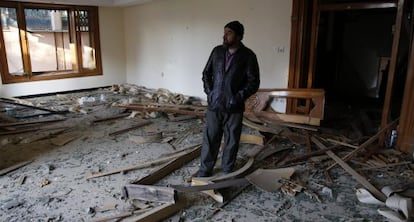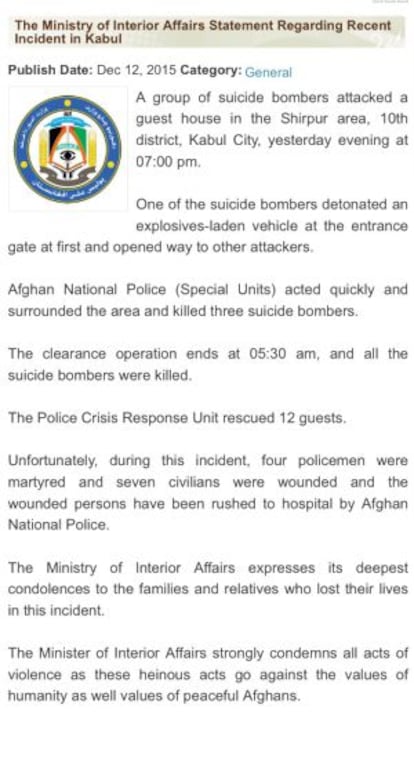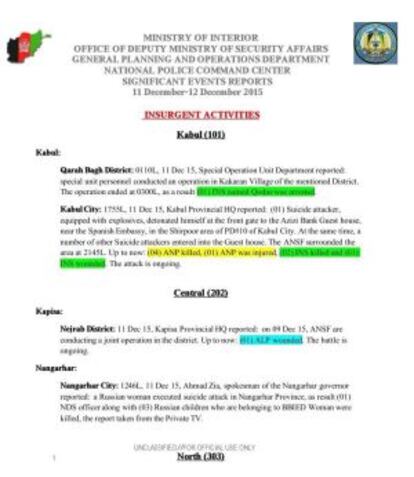Spain opens investigation into attack on Kabul embassy
Authorities seek to uncover facts surrounding assault in which two Spanish policemen died

An investigation has been set into motion to determine the facts behind a suicide attack at Spain’s embassy in Kabul on Friday, in which two Spanish police officers were killed.
The head of the Spanish National Police force, Ignacio Cosidó, on Saturday explained to police unions that Isidro Gabino Sanmartín Hernández, 48, had been shot dead during the attack when he emerged from the interior of the embassy. Jorge García Tudela, 45, was found dead in his quarters, with his weapon in his hand and cuts to his neck, suggesting that someone had entered his room and killed him.
The government acknowledged on Saturday that the bombing was “an attack against Spain” given that it had affected Spanish interests
According to sources from the Spanish Interior Ministry, “given that there were Spanish victims, and that the incident took place within our chancellery, written notification has been sent to the High Court public prosecutor.”
According to the same sources, “the prosecutor will file a complaint and the police will carry out the corresponding investigation, notwithstanding the fact that given that another country is involved, the authorities from said country will investigate, and, if necessary, will be able to arrest and try those responsible in their territory. That is to say, even though the Spanish justice system has jurisdiction, it is evident that what happens in another country will preferably be investigated and tried in said country.”

Under Spanish law, the country’s courts have powers to investigate attacks carried out abroad if they are “against Spanish authorities or Spanish public civil servants,” as well as terrorism offenses “when the crime has been committed against official Spanish installations, including their embassies and consulates.”
The government acknowledged on Saturday that the bombing was “an attack against Spain” given that it had affected Spanish interests – “The most valuable: human lives,” said Foreign Minister Jorge Fernández Díaz. But he went on to clarify that, rather than the Spanish embassy, the terrorists’ target was apparently a small guest house nearby that was regularly used by American citizens, according to information supplied by the Afghan police and authorities.
The Afghan government has posted two reports on the incident on its Interior Ministry webpage. The first, the only one that mentions the Spanish embassy, refers to a “suicide attacker, equipped with explosives, [who] detonated himself at the front gate to the Azizi Bank Guest House, near the Spanish embassy in the Shirpur area of Kabul city. At the same time, a number of other suicide attackers entered into the guest house.” The document confirms four deaths and one injured, as well as the two deaths and another injured among the supposed attackers.
The second document, dated December 12, which the Spanish government has classed as “official,” reads: “A group of suicide bombers attacked a guest house in the Shirpur area, 10th district, Kabul city, at 7pm.”
It continues: “One of the suicide bombers detonated an explosives-laden vehicle at the entrance gate at first and opened the way for other attackers.

“Afghan National Police (Special Units) acted quickly and surrounded the area and killed three suicide bombers.”
According to the report, all of the attackers were killed and the operation was concluded at 5.30am, which would indicate, according to the Afghans, that the attack lasted more than 10 hours.
A message sent by one of the Spanish police officers who survived the embassy attack on his colleagues spoke of “12 hours of gunfire, and grenade assaults right over our heads.”
The ministry document also mentions that 12 guests were rescued from the guest house, four police officers died, and seven civilians were injured.
Both reports, as well as the Spanish government, insist that the objective was the small hotel, and not the Spanish embassy.
English version by Simon Hunter.
Tu suscripción se está usando en otro dispositivo
¿Quieres añadir otro usuario a tu suscripción?
Si continúas leyendo en este dispositivo, no se podrá leer en el otro.
FlechaTu suscripción se está usando en otro dispositivo y solo puedes acceder a EL PAÍS desde un dispositivo a la vez.
Si quieres compartir tu cuenta, cambia tu suscripción a la modalidad Premium, así podrás añadir otro usuario. Cada uno accederá con su propia cuenta de email, lo que os permitirá personalizar vuestra experiencia en EL PAÍS.
¿Tienes una suscripción de empresa? Accede aquí para contratar más cuentas.
En el caso de no saber quién está usando tu cuenta, te recomendamos cambiar tu contraseña aquí.
Si decides continuar compartiendo tu cuenta, este mensaje se mostrará en tu dispositivo y en el de la otra persona que está usando tu cuenta de forma indefinida, afectando a tu experiencia de lectura. Puedes consultar aquí los términos y condiciones de la suscripción digital.








































